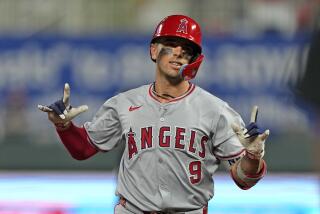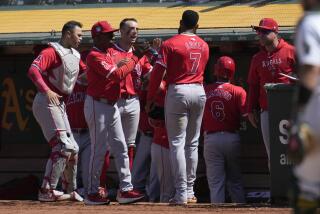Finley Loses No-Hitter in 8th; Angels Win, 5-0
- Share via
BOSTON — Only the lonely pitch no-hitters, or near no-hitters, as the Angels’ Chuck Finley discovered as he took a bid of his own into the eighth inning Friday night.
“By the sixth inning, I’d come in and sit down and there’d be 10 feet to either side of me,” Finley said. “Nobody would make conversation with me. They were isolating me.
“For a second, I thought about standing up and saying, ‘Anybody here got a no-hitter going?’ ”
A bold idea, flying in the face of baseball superstition, but ultimately, Finley chose not to break the silence.
Instead, he turned that assignment over to Boston Red Sox shortstop Jody Reed, whose two-out single with in the bottom of eighth proved to be the only hit Finley would allow in a 5-0 victory before 32,417 at Fenway Park.
Some single, too. It was a hush of a hit--a fastball in on the hands, fisted out to shallow center field, falling limply to the ground in front of an onrushing Devon White.
Enough to sabotage a no-hitter, it was barely enough to get an embarrassed Reed to claim it.
“It was a stinker, from the get-go,” Reed said. “It was a lucky hit. . . . I never should have swung at it. It was a mistake swing. Nine times out of 10, I’d have popped it up.”
Instead, Reed flared it out over second base, hitting it precisely where they ain’t and depriving old George Mogridge of some long-awaited company. Mogridge, pitching for the New York Yankees, is the last lefthander to no-hit the Red Sox in Fenway Park.
He did it in 1917.
Seventy two years later, Finley almost got there--stunning in itself, but just another re-affirmation of the astonishing progress Finley has made since being rushed from Class A in 1986. Or even 1988. Taking a career record of 14-23 into this season, his second as a starting pitcher, Finley is 7-2 with a 1.83 earned-run average.
That ranks Finley second in the American League in victories behind Oakland’s Dave Stewart, who is 8-2. And, among the Angels, Finley also ranks as the second pitcher in 1989 to:
(a) Throw a one-hitter.
(b) Shut out the Red Sox.
(c) Beat Roger Clemens.
Exactly four weeks earlier, teammate Kirk McCaskill threw a one-hitter against the Toronto Blue Jays, his no-hit bid ending on Nelson Liriano’s ninth-inning double. And 10 days earlier, rookie Jim Abbott also shut out at Red Sox and Clemens at Anaheim Stadium--also by a 5-0 score.
Yet, on this night, Finley couldn’t even lead the AL West in one-hitters. Guess who also threw one? Yes, four Oakland pitchers combined to one-hit the Yankees in a bit of one-upsmanship that kept the Athletics one-half game ahead of the Angels in the standings.
Just another round of mirror moves between the best in the West.
The shutout was the first of Finley’s professional career but after all the build-up--and the lack of attention in the Angel dugout--Finley was hoping for maybe a little more.
“I laid a few choice words around the stadium,” said Finley, who had to agree with Reed. He, too, thought Reed’s cue shot was a weak excuse for a base hit--and, for a second or two, thought that baseball was destined to wind up in the webbing of White’s Gold Glove.
“I thought it hung up there long enough for him,” Finley said. “It was like a sand wedge. I thought (White) was fixin’ to dive for it, but it just died on him.”
Angel Manager Doug Rader held the same opinion.
“God, I was hoping he would catch it,” Rader exclaimed. “I thought it was a lock. . . . I’ve seen so many (no-hitters) and Chuck was so dominant tonight. Sometimes, you just have the feeling it’s a lock.”
White simply said the ball “wasn’t close enough. I was playing shallow to start with, but it was one of those hits that are perfectly placed. I had a good jump on it and in my mind, I was going to dive for it.
“I started to, but it just died.”
As it did, Finley’s stab at history did the same.
Finley settled for his fourth complete game of the season, walking four while striking out five. He made 106 pitches and faced 30 batters, three over the minimum.
“He had good enough stuff to do it,” said Angel catcher Lance Parrish, who was on the receiving end of Jack Morris’ 1984 no-hitter. “The thing is, nobody really hit the ball hard off him. The only one I can think of was the ball Boggs hit to Claudell in the ninth.”
Parrish was referring to the line drive Wade Boggs hit to right field to lead off the ninth inning, which was caught by the Angels’ Claudell Washington.
In actuality, there was one other--a drive by Reed in the third inning that took Angel left fielder Chili Davis to the scoreboard at the base of the Green Monster before he flagged it down.
The only other less-than-routine outs came off the bats of Nick Esasky and Marty Barrett. Shortstop Dick Schofield grabbed Esasky’s sixth-inning grounder near second base, spun and threw him out at first. Barrett’s ninth-inning chopper forced third baseman Jack Howell to leave his feet, but after stopping the ball with a dive on the infield grass, Howell converted the out at first.
And, of course, Reed’s eighth-inning ball would’ve been routine . . . if only he’d made better contact.
“A bad swing,” Reed said. “It was in on my hands. He threw it exactly where he wanted it.”
Too bad for Finley it didn’t end up where he wanted it.
Angel Notes
The Angels scored five runs on seven hits against Roger Clemens (5-4), including a mammoth home run over the left-field wall by Lance Parrish. But the first run, breaking a scoreless tie in the sixth inning, helped earn Boston Manager Joe Morgan his first ejection of the season. With Dick Schofield on first base, Claudell Washington lined a ball that bounced just inside the right-field line and then bounded into foul territory, ambushing the ball boy customary stationed alongside the outfield box seats. The ball boy tried to jump out of the way, but the baseball struck one of his feet before right fielder Dwight Evans could throw home--too late to prevent Schofield from scoring. Morgan immediately burst from the dugout, claiming interference and arguing that Schofield should have been held at third. First base umpire Larry Barnett thumbed Morgan out of the game and cited baseball rule 3.15, which, in short, states that any “unintentional interference” by an person authorized to be on the playing field shall result in a live ball. The debate was rendered moot, however, by Johnny Ray, who immediately followed with a double to left that would have scored Schofield with ease.
More to Read
Go beyond the scoreboard
Get the latest on L.A.'s teams in the daily Sports Report newsletter.
You may occasionally receive promotional content from the Los Angeles Times.






